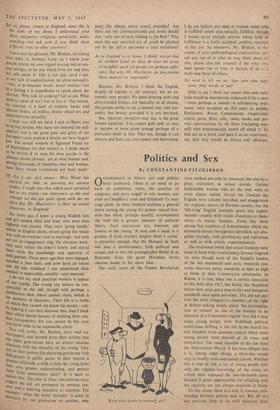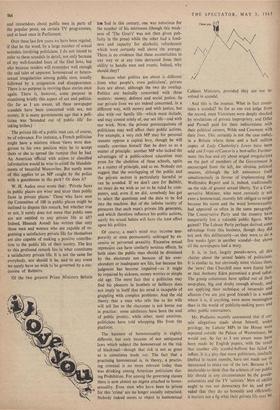Politics and Sex
By CONSTANTINE FITZGIBBON
OCCASIONALLY in history sex and politics have coalesced. There is no need to go back to prehistoric times, the practice of exogamy, and wars waged to win women, nor even to Cleopatra's nose and Elizabeth I's mar- riage plans. In more modern societies a general desire among the young for greater sexual free- dom has often, perhaps usually, accompanied the wish for a greater measure of political liberty. Such aspirations are, however, not limited to the young. 'A man and a maid in a garden, if God couldn't forgive them I could,' is attractive enough. But the Marquis de Sade Was also a revolutionary, both political and sexual, and so was the pornographer Restif de la Bretonne. Even the great Mirabeau wrote obscene hooks in his spare time.
The early years of the French Revolution 'Keep your hands to yourself, sir!' were marked not only by massacre, but also by a great relaxation in sexual morals. Certain fashionable women who set the tone went to routs almost naked. AcrosS the Channel the English were suitably horrified, and exaggerated the orgiastic nature of Parisian society, but the left-wing' English romantic poets also experi- mented—usually with results disastrous to them- selves—in sexual freedom. From this there sprang that tradition of bohemianism which the ninteenth-century bourgeoisie identified, not alto- gether wrongly, with promiscuity and radicalism as well as with artistic experimentation.
The traditional belief that sexual freedom went hand in hand with revolutionary fervour lingered on, even though most of the SocialiSt leaders of the late nineteenth and early twentieth cen- turies observed moral standards at least as high as those of their Conservative adversaries. In Russia, it is true, there was a certain relaxation in this field after 1917, but Stalin, like Napoleon before him, soon put a stop to this and bourgeois standards once again prevailed. This did not pre- vent the more imaginative members of the right in Britain talking darkly about 'the nationalisa- tion of women' as one of the horrors to be expected of a Communist regime. Nor did it stop many young people with ill-defined political convictions drifting to the left in the search for that freedom from parental control which most young people have desired at all times and everywhere. The latest example of this has been the Aldermaston March. It has been alleged that it is, among other things, a three-day sexual
orgy in muddy tents and rented schools. Whether this is true or not, a lot of young people with only the vaguest knowledge of the issues in- volved have espoused the ban-the-bomb cause because it gives opportunities for mingling with the opposite sex not always available at home.
To this extent there is a real, if tenuous, rela- tionship between politics and sex. But all this has precious little to do with salacious hints
and innuendoes about public men in parts of the popular press, on certain TV programmes, and at least once in Parliament.
Over these last few years we have been regaled, if that be the word, by a large number of sexual scandals involving politicians. I do not intend to refer to these scandals in detail, not only because of my well-founded fears of the libel laws, but also because readers will remember well enough the sad tales of apparent homosexual or hetero- sexual irregularities among public men, usually followed by a resignation and disappearance. There is no purpose in reviving these stories once again. There is, however, some purpose in examining briefly this aspect of sex and politics. (So far as I am aware, all these newspaper scandals have been concerned with sex, not money. It is many governments ago that a poli- tician was 'hounded out of public life' for taking bribes.) .
The private life of a public man can, of course, be of relevance. For instance, a French politician might have a mistress whose views were dan- gerous to his own position were he to accept them or she to spread the rumour that he had. An American official with access to classified information would be wise to avoid the blandish- ments of beautiful Muscovites. But surely none of this applies to an MP caught by the police with a guardsman in the park? Or does it?
W. H. Auden once wrote that: `Private faces in public places are wiser and nicer than public faces in private places.' Those who have seen the Committee of 100 in public places might be inclined to dispute this remark, but whether true or not, it surely does not mean that public men are not entitled to any private life at all? Indeed, Hannah Arendt has written that only those men and women who are capable of or- ganising a satisfactory private life for themselves are also capable of making a positive contribu- tion to the public life of their society. The key to this profound remark lies in what constitutes a satisfactory private life. It is not the same for everybody, nor should it be, and -in any event we surely have no wish to be governed by a suc- cession of Babbitts.
Of the two greatest Prime Ministers Britain has had in this century, one was notorious for the number of his mistresses (though this weak- ness of `The Goat's' was not then given pub- licity in the press) while the other had a fond- ness and capacity for alcoholic refreshment which were •certainly well above the average. There is no evidence that these eccentricities in any way or at any time detracted from their ability to handle men and events. Indeed, why should they?
Because what politics are about is different from what people's, even ,politicians', private lives are about, although the two do overlap. Politics are basically concerned with three matters: money, defence and social justice. In our private lives we are indeed concerned, in a different way, with money and with justice, but also with-our family life—which must include, and may consist solely of, our sex life—and with our work. Now, the private preoccupations of politicians may well affect their public actions. For example, a very rich MP may for personal reasons oppose a capital levy, though he will usually convince himself that he does so as a matter of principle: another MP who lacked the advantages of a public-school education may press for the abolition of these schools, again as a matter of principle, and so on. Nobody can suggest that the overlapping of the public and the private sectors is particularly harmful or can be avoided. If we don't care for Babbitt, no more do we wish as yet to be ruled by com- puters, and, even if we did, somebody has got to select the questions and the data to be fed into the machine. But of the infinite variety of pressures that each man's private life generates, and which therefore influence his public actions, surely his sexual habits will have the least effect upon his politics.
Of course, a man's mind may become tem- porarily or even permanently unhinged by ex- cessive or perverted sexuality. Excessive sexual repression can have similarly noxious effects. In- both cases the public man should be dismissed by the electorate not because of his over- abundant or inadequate sex life, but because his judgment has become impaired—as it might be impaired by sickness, money worries or simple old age. The mere fact that a politician may find his pleasure in brothels or bellboys does not imply in itself that his mind is incapable of grappling with complex problems. And the old theory that a man who tells lies to his wife will tell lies to the electorate is not borne out in practice: some adulterers have been the soul of public probity, while other, most uxorious, politicians have told whopping fibs from the platform.
The business of homosexuality is slightly different, but only because of our antiquated laws which subject the homosexual to the 'risk of blackmail—though that risk is not as great as is sometimes made out. The fact that a practising homosexual is, in theory, a practis- ing criminal is no more relevant today than was drinking among American politicians dur- ing Prohibition. For among the governing classes there is now almost no stigma attached to homo- sexuality. Even men who have been to prison for this 'crime' are no longer socially ostracised. Nobody indeed seems to object to homosexual Cabinet Ministers, provided they are not in- volved in scandal.
And this is the essence. What in fact consti- tutes a scandal? So far as one can judge from the record, most Victorians were deeply shocked by revelations of private impropriety, and Dilke and Parnell paid for their indiscretions with their political careers, Wilde and Casement with their lives. This certainly is not the case today, in a Britain where three and a half million copies of Lady Chatterley's Lover have been sold and Tropic of Canceris a best-seller. Further- more this hue and cry about swat irregularities on the part of members of the Government is encouraged from the left, for obvious political reasons, although the left announces itself simultaneously in favour of implementing the Wolfenden Report and is, indeed, traditionally on the side of greater sexual liberty. Yet a Con- servative Minister, who most , certainly is not even a homosexual, recently felt obliged to resign because his name and the word homosexuality had appeared so often in the same paragraph.
The Conservative Party and the country have temporarily lost a valuable -public figure. Who gained? The Labour Party perhaps derived some advantage from this business, though they did not seek this deliberately—as they were to do a few weeks llter in another scandal—but above all the newspapers had a story.
It is, ' in fact, largely pseudo-news, all this chatter about the sexual habits of politicians. It 'is similar to, but obviously more vicious than, the 'news' that Churchill once wore funny hats or that Anthony Eden patronised a good tailor. The gossip columnists have spilled out of their soup-plate, big and sloshy enough already, and are applying their technique of innuendo and allusion (`we are just good friends') in a world where it is, if anything, even more meaningless than in the world of publicity-seeking peers and other public entertainers.
Mr. Profumo recently announced that if cer- tain allegations made about himself, under privilege, by Labour MPs in the House were repeated outside the Palace of Westminster, be would sue. So far as I am aware none have been made by English papers, with the result that another silly scandal-balloon has failed to inflate. It is, a pity that more politicians, similarly libelled in recent months, have not made use or threatened to make -use of the law. Because it is intolerable to think that the arbiters of our public life' should in any circumstances be the gossip- columnists and the TV `satirists.' Men of ability ought to run our democracy for us, and pro- vided that they do so honestly and efficiently, it matters not a fig what their private life may be.







































 Previous page
Previous page